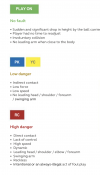JRugby2
Colin Windon (37)
It's dead ball line, and you own the dead ball line you’re running away from when in possession, the opposite doesn’t make logical sense and would mean every backwards pass was forwards, knock backs would be knock ons, etc.
And I strongly disagree with your assertion that the “knock” is the key action in that sentence.
“A player must not intentionally knock the ball forward with hand or arm.”
To me - the sentence relies on the premise that the ball must travel forwards off the hand or arm, for it to be triggered in law. Ball goes backwards.
And I strongly disagree with your assertion that the “knock” is the key action in that sentence.
“A player must not intentionally knock the ball forward with hand or arm.”
To me - the sentence relies on the premise that the ball must travel forwards off the hand or arm, for it to be triggered in law. Ball goes backwards.



